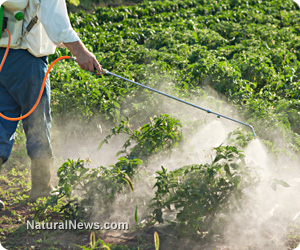Research - Roundup toxicity much worse than what Monsanto, government claims
(NaturalNews) Glyphosate, one the world's top-selling herbicide formulas, is also one of the most toxic, according to a recent study published in the open-access journal Ecotoxicology. Contrary to the unfounded safety claims made by Monsanto and its bedfellows in government, glyphosate's toxicity is much more prolific throughout the environment than previously thought, even at levels far below what is generally considered by federal regulators to be "safe."
Case-in-point is the chemical's effect on the Daphnia magna, also known as the freshwater water flea, an aquatic invertebrate species that, according to data procured by Monsanto, is not negatively affected by typical levels of glyphosate exposure. According to tests recently conducted on the D. magna, glyphosate is not only toxic at levels commonly found in the environment, but it is also harmful at much lower levels.
Based on tests involving various clones and age classes of D. magna, researchers from the Centre for Biosafety at the University of Tromso in Norway found that, even at miniscule levels, glyphosate and Roundup are both acutely and chronically toxic to aquatic creatures. Even at sublethal nominal concentrations of as little as 0.05 milligrams per liter (mg/l) of one of the primary active ingredients in glyphosate, D. magna underwent notable developmental changes.
Exposed species were also more prone to having reproductive problems and unexpected abortions, not to mention early mortality. All across the board at all levels of exposure, glyphosate and Roundup were found to induce negative side effects in creatures that were supposed to be exempt from its mechanistic action. And these findings are more than likely just the tip of the iceberg ecologically speaking, as many more species are probably also affected.
"The results indicate that aquatic invertebrate ecology can be adversely affected by relevant ambient concentrations of this major herbicide," wrote the authors in their abstract, noting that at relatively low levels of exposure, glyphosate was found to be toxic in almost all tested parameters. "We conclude that glyphosate and Roundup toxicity to aquatic invertebrates have been underestimated and that current European Commission and U.S. EPA toxicity classification of these chemicals need to be revised."
Low levels of glyphosate exposure also toxic to humans
Any consideration of glyphosate's toxicity that fails to mention its effects on humans, however, would be incomplete. Numerous studies, including one recently published in the online journal Entropy, have found that low levels of glyphosate exposure in humans is also problematic, leading to conditions such as Parkinson's disease, infertility, and cancer.
A majorly overlooked mechanism of its toxicity, glyphosate's inhibitory action against cytochrome P450 (CYP) in humans and other mammals is one of the primary ways in which the chemical disrupts normal, healthy biology. Researchers have uncovered the fact that glyphosate impedes the body's ability to properly detoxify, as well as promotes the type of chronic inflammation that leads to more serious health impediments down the road.
"Negative impact on the body is insidious and manifests slowly over time as inflammation damages cellular systems throughout the body," wrote the authors about the long-term damaging effects of glyphosate. "[Glyphosate] residues enhance the damaging effects of other food-borne chemical residues and toxins in the environment to disrupt normal body functions and induce disease."
Other prominent research has found that glyphosate directly damages and kills human cells, including embryonic, placental, and umbilical cord cells. Many of the inert, or supposedly "inactive," ingredients added to Roundup and other glyphosate formulas are also highly damaging, having been found to directly interfere with normal hormone production and cellular function in otherwise healthy persons, as well as fetal development in pregnant women.
Sources for this article include:
http://www.gmwatch.org
http://articles.washingtonpost.com
http://www.scientificamerican.com




